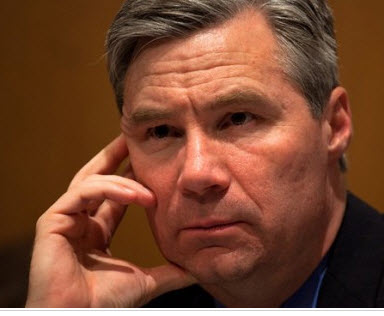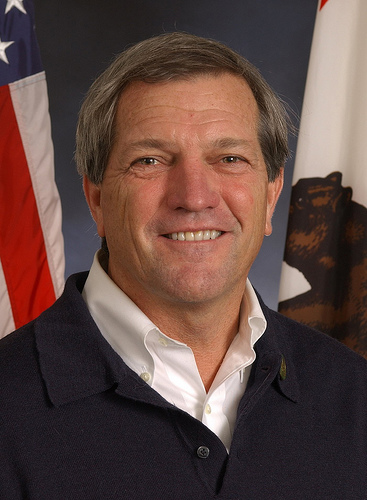 |
| Wisconsin Governor Scott Walker |
Wisconsin Governor Scott Walker issued the following statement after the federal courts struck down Wisconsin's gay marriage ban:
"For us, it's over in Wisconsin," Walker said, according to the Associated Press. "The federal courts have ruled that this decision by this court of appeals decision is the law of the land and we will be upholding it."
Notice that it's over in the Dairy State, but not necessarily in the United States. Governor Walker's statewide options are limited, but as President, there will be so much he (and his supporters) can do.
During his third campaign for governor, Walker remained silent on the issue, too. Talking Points Memo reported:
Wisconsin Gov. Scott Walker (R) seemed to bend over backward during a Thursday news conference to avoid articulating a position on same-sex marriage.
"It really doesn't matter what I think now," Walker said, as quoted by the Milwaukee Journal-Sentinel. "It's in the Constitution."
In a sense, that is the best answer a governor can give at this time. Marriage is not defined by a politician, and most reporters are not interested in a genuine appraisal of this or other Republican lawmakers' take on gay marriage, but rather seek to incite controversy and discomfort. If anything, Walker's non-answer was the best one. Why are we even discussing the definition of marriage? Surviving and thriving civilizations have already settled this discussion: marriage is between one man and one woman.
To all concerned partisans upset with Walker's non-stance on the gay marriage concern, what would they like him to do right now?
The deeper problem with the redefinition of marriage is not the militancy of gay rights groups, or the ideological questions about homosexuality, its etiology and its biological origins, but the arrogant usurpation of state and federal courts imposing the redefinition of marriage on the American public.
Even in liberal California, a clear majority of voters defined marriage as between one man and one woman, to be enshrined in the state constitution, which the Supreme Court summarily overturned on legal technicalities.
The first fight must focus on the illiberal, uncivil, and illegal federal judiciary. President Walker would be in the perfect position to nominate strong conservative judges who would respect the integrity of the Constitution and the supremacy of the states and the people vs. the federal government.
Right now, Walker the governor has just won reelection a third time in this blue state, and he must deal with budget battles and ideological conflicts of a number of sorts, like union entitlements and academic abuse of tax dollars. School choice, welfare reform, and tax cuts are not just preeminent but fully within his and his Republican legislature's power to work on effectively.
One battle at a time.
Furthermore, conservative partisans worried about the state of marriage should ask more probing questions about the role of the government and the family. Perhaps pro-family forces need to make the case for marriage in a way that even the most unaware can understand. Too many Republicans have argued for marriage as a matter of tradition. That line of reasoning has no value in a court of law, and jurists have rebuked such briefs by reminding pro-marriage advocates that slavery and segregation where traditional legal frameworks for decades.
The appeal to history, biology, sociology, and scientific research must become the norm in future cases. Pro-family forces in Massachusetts, particularly MassResistance, have proceeded effectively in other countries to push back against the unsightly juggernaut of homosexual marriage. Marriage proponents need to make their case locally, based on facts and legacies. Why is marriage important?
The answers are plentiful and well-documented: strong families united with a father and a mother; the properly development of children into strong adults. A lower cost on social services; no expansive welfare state to make up for the lack of parenting; the diminution of venereal disease; the long-term stability of the rule of law, including public safety, etc.
In the meantime, marriage activists must inform the governor of the dire need to protect businesses, churches, and charities from unwarranted lawsuits. Live and let live may have to be the standard for now, but with a freedom-loving governor appealing to the truth and dignity of a free America, founded on Judeo-Christian values, there is no reason to suspect that Walker has given up on defining and thus defending marriage.
Last of all, Presidential contenders may want to embrace the Balanced Budget convention proposal and include the definition of marriage within it. Perhaps removing the institution from government purview altogether and restoring its civil sanctity away from state sanction would be the best approach.
Whatever measures one pursues, conservative partisans and Republicans in general should not fault Walker for not taking up the fight on gay marriage at this time. His record and rhetoric affirm that Walker is a committed conservative Christian (he even tweeted Philippians 4: 19 on his official Twitter account and openly discusses his prayer life), and his belief in true marriage has not waivered.
In a sense, that is the best answer a governor can give at this time. Marriage is not defined by a politician, and most reporters are not interested in a genuine appraisal of this or other Republican lawmakers' take on gay marriage, but rather seek to incite controversy and discomfort. If anything, Walker's non-answer was the best one. Why are we even discussing the definition of marriage? Surviving and thriving civilizations have already settled this discussion: marriage is between one man and one woman.
To all concerned partisans upset with Walker's non-stance on the gay marriage concern, what would they like him to do right now?
The deeper problem with the redefinition of marriage is not the militancy of gay rights groups, or the ideological questions about homosexuality, its etiology and its biological origins, but the arrogant usurpation of state and federal courts imposing the redefinition of marriage on the American public.
Even in liberal California, a clear majority of voters defined marriage as between one man and one woman, to be enshrined in the state constitution, which the Supreme Court summarily overturned on legal technicalities.
The first fight must focus on the illiberal, uncivil, and illegal federal judiciary. President Walker would be in the perfect position to nominate strong conservative judges who would respect the integrity of the Constitution and the supremacy of the states and the people vs. the federal government.
Right now, Walker the governor has just won reelection a third time in this blue state, and he must deal with budget battles and ideological conflicts of a number of sorts, like union entitlements and academic abuse of tax dollars. School choice, welfare reform, and tax cuts are not just preeminent but fully within his and his Republican legislature's power to work on effectively.
 |
| Walker after 2014 victory (WisPolitics.com) |
One battle at a time.
Furthermore, conservative partisans worried about the state of marriage should ask more probing questions about the role of the government and the family. Perhaps pro-family forces need to make the case for marriage in a way that even the most unaware can understand. Too many Republicans have argued for marriage as a matter of tradition. That line of reasoning has no value in a court of law, and jurists have rebuked such briefs by reminding pro-marriage advocates that slavery and segregation where traditional legal frameworks for decades.
The appeal to history, biology, sociology, and scientific research must become the norm in future cases. Pro-family forces in Massachusetts, particularly MassResistance, have proceeded effectively in other countries to push back against the unsightly juggernaut of homosexual marriage. Marriage proponents need to make their case locally, based on facts and legacies. Why is marriage important?
The answers are plentiful and well-documented: strong families united with a father and a mother; the properly development of children into strong adults. A lower cost on social services; no expansive welfare state to make up for the lack of parenting; the diminution of venereal disease; the long-term stability of the rule of law, including public safety, etc.
In the meantime, marriage activists must inform the governor of the dire need to protect businesses, churches, and charities from unwarranted lawsuits. Live and let live may have to be the standard for now, but with a freedom-loving governor appealing to the truth and dignity of a free America, founded on Judeo-Christian values, there is no reason to suspect that Walker has given up on defining and thus defending marriage.
Last of all, Presidential contenders may want to embrace the Balanced Budget convention proposal and include the definition of marriage within it. Perhaps removing the institution from government purview altogether and restoring its civil sanctity away from state sanction would be the best approach.
Whatever measures one pursues, conservative partisans and Republicans in general should not fault Walker for not taking up the fight on gay marriage at this time. His record and rhetoric affirm that Walker is a committed conservative Christian (he even tweeted Philippians 4: 19 on his official Twitter account and openly discusses his prayer life), and his belief in true marriage has not waivered.





















rev.jpg/220px-Jerry_Voorhis_(portrait)rev.jpg)






